
| Vehicle | Curb weight | Difference from world's smallest | Weight to power ratio | 0—60 mph acceleration ratio | Consumption ratio |
|---|---|---|---|---|---|
| 2.4 GDI |
1465 kg / 3230 lbs |
1040 kg (2293 lbs) heavier | 8 kg to 1 hp | - |
181 kg/L (399 lbs/L) |
| 1.6 GDI Turbo |
1490 kg / 3285 lbs |
1065 kg (2348 lbs) heavier | 8 kg to 1 hp | - |
196 kg/L (432 lbs/L) |
| 2.0 GDI Turbo |
1614 kg / 3559 lbs |
1189 kg (2622 lbs) heavier | 7 kg to 1 hp | - |
165 kg/L (364 lbs/L) |
| 1.6 CRDi |
1605 kg / 3539 lbs |
1180 kg (2602 lbs) heavier | 12 kg to 1 hp | - |
365 kg/L (805 lbs/L) |
| 2.0 GDI |
1723 kg / 3799 lbs |
1298 kg (2862 lbs) heavier | 11 kg to 1 hp | - |
749 kg/L (1652 lbs/L) |
| Vehicle | 2.4 GDI |
|---|---|
| Curb weight |
1465 kg / 3230 lbs |
| Difference from world's smallest | 1040 kg (1040 lbs) heavier |
| Weight to power ratio | 8 kg to 1 hp |
| 0—60 mph acceleration ratio | - |
| Consumption ratio |
181 kg/L (399 lbs/L) |
| Vehicle | 1.6 GDI Turbo |
| Curb weight |
1490 kg / 3285 lbs |
| Difference from world's smallest | 1065 kg (1065 lbs) heavier |
| Weight to power ratio | 8 kg to 1 hp |
| 0—60 mph acceleration ratio | - |
| Consumption ratio |
196 kg/L (432 lbs/L) |
| Vehicle | 2.0 GDI Turbo |
| Curb weight |
1614 kg / 3559 lbs |
| Difference from world's smallest | 1189 kg (1189 lbs) heavier |
| Weight to power ratio | 7 kg to 1 hp |
| 0—60 mph acceleration ratio | - |
| Consumption ratio |
165 kg/L (364 lbs/L) |
| Vehicle | 1.6 CRDi |
| Curb weight |
1605 kg / 3539 lbs |
| Difference from world's smallest | 1180 kg (1180 lbs) heavier |
| Weight to power ratio | 12 kg to 1 hp |
| 0—60 mph acceleration ratio | - |
| Consumption ratio |
365 kg/L (805 lbs/L) |
| Vehicle | 2.0 GDI |
| Curb weight |
1723 kg / 3799 lbs |
| Difference from world's smallest | 1298 kg (1298 lbs) heavier |
| Weight to power ratio | 11 kg to 1 hp |
| 0—60 mph acceleration ratio | - |
| Consumption ratio |
749 kg/L (1652 lbs/L) |

| Vehicle | Curb weight | Difference from world's smallest | Weight to power ratio | 0—60 mph acceleration ratio | Consumption ratio |
|---|---|---|---|---|---|
| 2.0 CVVL |
1495 kg / 3296 lbs |
1070 kg (2359 lbs) heavier | 9 kg to 1 hp | 147 kg/s (324 lbs/s) |
199 kg/L (439 lbs/L) |
| 1.6 T-GDI |
1495 kg / 3296 lbs |
1070 kg (2359 lbs) heavier | 8 kg to 1 hp | 176 kg/s (388 lbs/s) |
245 kg/L (540 lbs/L) |
| 1.6 CRDi |
1560 kg / 3440 lbs |
1135 kg (2503 lbs) heavier | 11 kg to 1 hp | 139 kg/s (306 lbs/s) |
363 kg/L (800 lbs/L) |
| GT 2.0 T-GDI |
1605 kg / 3539 lbs |
1180 kg (2602 lbs) heavier | 7 kg to 1 hp | 223 kg/s (492 lbs/s) |
180 kg/L (397 lbs/L) |
| 2.0 GDI |
1815 kg / 4002 lbs |
1390 kg (3065 lbs) heavier | 12 kg to 1 hp | - |
1210 kg/L (2668 lbs/L) |
| Vehicle | 2.0 CVVL |
|---|---|
| Curb weight |
1495 kg / 3296 lbs |
| Difference from world's smallest | 1070 kg (1070 lbs) heavier |
| Weight to power ratio | 9 kg to 1 hp |
| 0—60 mph acceleration ratio | 147 kg/s (324 lbs/s) |
| Consumption ratio |
199 kg/L (439 lbs/L) |
| Vehicle | 1.6 T-GDI |
| Curb weight |
1495 kg / 3296 lbs |
| Difference from world's smallest | 1070 kg (1070 lbs) heavier |
| Weight to power ratio | 8 kg to 1 hp |
| 0—60 mph acceleration ratio | 176 kg/s (388 lbs/s) |
| Consumption ratio |
245 kg/L (540 lbs/L) |
| Vehicle | 1.6 CRDi |
| Curb weight |
1560 kg / 3440 lbs |
| Difference from world's smallest | 1135 kg (1135 lbs) heavier |
| Weight to power ratio | 11 kg to 1 hp |
| 0—60 mph acceleration ratio | 139 kg/s (306 lbs/s) |
| Consumption ratio |
363 kg/L (800 lbs/L) |
| Vehicle | GT 2.0 T-GDI |
| Curb weight |
1605 kg / 3539 lbs |
| Difference from world's smallest | 1180 kg (1180 lbs) heavier |
| Weight to power ratio | 7 kg to 1 hp |
| 0—60 mph acceleration ratio | 223 kg/s (492 lbs/s) |
| Consumption ratio |
180 kg/L (397 lbs/L) |
| Vehicle | 2.0 GDI |
| Curb weight |
1815 kg / 4002 lbs |
| Difference from world's smallest | 1390 kg (1390 lbs) heavier |
| Weight to power ratio | 12 kg to 1 hp |
| 0—60 mph acceleration ratio | - |
| Consumption ratio |
1210 kg/L (2668 lbs/L) |

| Vehicle | Curb weight | Difference from world's smallest | Weight to power ratio | 0—60 mph acceleration ratio | Consumption ratio |
|---|---|---|---|---|---|
| 1.7 CRDI |
1545 kg / 3407 lbs |
1120 kg (2470 lbs) heavier | 11 kg to 1 hp | 159 kg/s (351 lbs/s) |
351 kg/L (774 lbs/L) |
| 2.0 CVVL |
1495 kg / 3296 lbs |
1070 kg (2359 lbs) heavier | 9 kg to 1 hp | 147 kg/s (324 lbs/s) |
197 kg/L (434 lbs/L) |
| GT 2.0 T-GDI |
1605 kg / 3539 lbs |
1180 kg (2602 lbs) heavier | 7 kg to 1 hp | 223 kg/s (492 lbs/s) |
196 kg/L (432 lbs/L) |
| 2.0 GDi |
1815 kg / 4002 lbs |
1390 kg (3065 lbs) heavier | 12 kg to 1 hp | 197 kg/s (434 lbs/s) |
1296 kg/L (2858 lbs/L) |
| Vehicle | 1.7 CRDI |
|---|---|
| Curb weight |
1545 kg / 3407 lbs |
| Difference from world's smallest | 1120 kg (1120 lbs) heavier |
| Weight to power ratio | 11 kg to 1 hp |
| 0—60 mph acceleration ratio | 159 kg/s (351 lbs/s) |
| Consumption ratio |
351 kg/L (774 lbs/L) |
| Vehicle | 2.0 CVVL |
| Curb weight |
1495 kg / 3296 lbs |
| Difference from world's smallest | 1070 kg (1070 lbs) heavier |
| Weight to power ratio | 9 kg to 1 hp |
| 0—60 mph acceleration ratio | 147 kg/s (324 lbs/s) |
| Consumption ratio |
197 kg/L (434 lbs/L) |
| Vehicle | GT 2.0 T-GDI |
| Curb weight |
1605 kg / 3539 lbs |
| Difference from world's smallest | 1180 kg (1180 lbs) heavier |
| Weight to power ratio | 7 kg to 1 hp |
| 0—60 mph acceleration ratio | 223 kg/s (492 lbs/s) |
| Consumption ratio |
196 kg/L (432 lbs/L) |
| Vehicle | 2.0 GDi |
| Curb weight |
1815 kg / 4002 lbs |
| Difference from world's smallest | 1390 kg (1390 lbs) heavier |
| Weight to power ratio | 12 kg to 1 hp |
| 0—60 mph acceleration ratio | 197 kg/s (434 lbs/s) |
| Consumption ratio |
1296 kg/L (2858 lbs/L) |
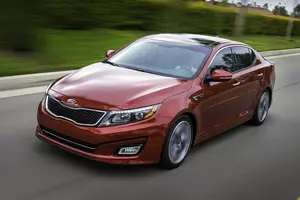
| Vehicle | Curb weight | Difference from world's smallest | Weight to power ratio | 0—60 mph acceleration ratio | Consumption ratio |
|---|---|---|---|---|---|
| 2.0 CVVL |
1470 kg / 3241 lbs |
1045 kg (2304 lbs) heavier | 9 kg to 1 hp | 147 kg/s (324 lbs/s) |
196 kg/L (432 lbs/L) |
| 1.7 CRDi |
1515 kg / 3341 lbs |
1090 kg (2404 lbs) heavier | 11 kg to 1 hp | 159 kg/s (351 lbs/s) |
329 kg/L (725 lbs/L) |
| 2.0 GDI |
1780 kg / 3925 lbs |
1355 kg (2988 lbs) heavier | 12 kg to 1 hp | - |
1338 kg/L (2950 lbs/L) |
| GT 2.0 T-GDI |
1580 kg / 3484 lbs |
1155 kg (2547 lbs) heavier | 6 kg to 1 hp | 226 kg/s (498 lbs/s) |
193 kg/L (426 lbs/L) |
| Vehicle | 2.0 CVVL |
|---|---|
| Curb weight |
1470 kg / 3241 lbs |
| Difference from world's smallest | 1045 kg (1045 lbs) heavier |
| Weight to power ratio | 9 kg to 1 hp |
| 0—60 mph acceleration ratio | 147 kg/s (324 lbs/s) |
| Consumption ratio |
196 kg/L (432 lbs/L) |
| Vehicle | 1.7 CRDi |
| Curb weight |
1515 kg / 3341 lbs |
| Difference from world's smallest | 1090 kg (1090 lbs) heavier |
| Weight to power ratio | 11 kg to 1 hp |
| 0—60 mph acceleration ratio | 159 kg/s (351 lbs/s) |
| Consumption ratio |
329 kg/L (725 lbs/L) |
| Vehicle | 2.0 GDI |
| Curb weight |
1780 kg / 3925 lbs |
| Difference from world's smallest | 1355 kg (1355 lbs) heavier |
| Weight to power ratio | 12 kg to 1 hp |
| 0—60 mph acceleration ratio | - |
| Consumption ratio |
1338 kg/L (2950 lbs/L) |
| Vehicle | GT 2.0 T-GDI |
| Curb weight |
1580 kg / 3484 lbs |
| Difference from world's smallest | 1155 kg (1155 lbs) heavier |
| Weight to power ratio | 6 kg to 1 hp |
| 0—60 mph acceleration ratio | 226 kg/s (498 lbs/s) |
| Consumption ratio |
193 kg/L (426 lbs/L) |

| Vehicle | Curb weight | Difference from world's smallest | Weight to power ratio | 0—60 mph acceleration ratio | Consumption ratio |
|---|---|---|---|---|---|
| 2.0 T-GDI |
1573 kg / 3468 lbs |
1148 kg (2531 lbs) heavier | 6 kg to 1 hp | - | - |
| 2.4 GDI |
1484 kg / 3272 lbs |
1059 kg (2335 lbs) heavier | 8 kg to 1 hp | - |
171 kg/L (377 lbs/L) |
| 2.0 CVVT 16V EcoDynamics |
1500 kg / 3308 lbs |
1075 kg (2371 lbs) heavier | 9 kg to 1 hp | 153 kg/s (337 lbs/s) |
306 kg/L (675 lbs/L) |
| 1.7 CRDi 16V |
1520 kg / 3352 lbs |
1095 kg (2415 lbs) heavier | 11 kg to 1 hp | 138 kg/s (304 lbs/s) |
253 kg/L (558 lbs/L) |
| 2.0 CVVT 16V |
1403 kg / 3094 lbs |
978 kg (2157 lbs) heavier | 9 kg to 1 hp | 156 kg/s (344 lbs/s) |
200 kg/L (441 lbs/L) |
| 2.0i 16V Hybrid |
1587 kg / 3499 lbs |
1162 kg (2562 lbs) heavier | 11 kg to 1 hp | 178 kg/s (392 lbs/s) |
311 kg/L (686 lbs/L) |
| Vehicle | 2.0 T-GDI |
|---|---|
| Curb weight |
1573 kg / 3468 lbs |
| Difference from world's smallest | 1148 kg (1148 lbs) heavier |
| Weight to power ratio | 6 kg to 1 hp |
| 0—60 mph acceleration ratio | - |
| Consumption ratio | - |
| Vehicle | 2.4 GDI |
| Curb weight |
1484 kg / 3272 lbs |
| Difference from world's smallest | 1059 kg (1059 lbs) heavier |
| Weight to power ratio | 8 kg to 1 hp |
| 0—60 mph acceleration ratio | - |
| Consumption ratio |
171 kg/L (377 lbs/L) |
| Vehicle | 2.0 CVVT 16V EcoDynamics |
| Curb weight |
1500 kg / 3308 lbs |
| Difference from world's smallest | 1075 kg (1075 lbs) heavier |
| Weight to power ratio | 9 kg to 1 hp |
| 0—60 mph acceleration ratio | 153 kg/s (337 lbs/s) |
| Consumption ratio |
306 kg/L (675 lbs/L) |
| Vehicle | 1.7 CRDi 16V |
| Curb weight |
1520 kg / 3352 lbs |
| Difference from world's smallest | 1095 kg (1095 lbs) heavier |
| Weight to power ratio | 11 kg to 1 hp |
| 0—60 mph acceleration ratio | 138 kg/s (304 lbs/s) |
| Consumption ratio |
253 kg/L (558 lbs/L) |
| Vehicle | 2.0 CVVT 16V |
| Curb weight |
1403 kg / 3094 lbs |
| Difference from world's smallest | 978 kg (978 lbs) heavier |
| Weight to power ratio | 9 kg to 1 hp |
| 0—60 mph acceleration ratio | 156 kg/s (344 lbs/s) |
| Consumption ratio |
200 kg/L (441 lbs/L) |
| Vehicle | 2.0i 16V Hybrid |
| Curb weight |
1587 kg / 3499 lbs |
| Difference from world's smallest | 1162 kg (1162 lbs) heavier |
| Weight to power ratio | 11 kg to 1 hp |
| 0—60 mph acceleration ratio | 178 kg/s (392 lbs/s) |
| Consumption ratio |
311 kg/L (686 lbs/L) |
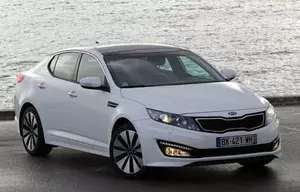
| Vehicle | Curb weight | Difference from world's smallest | Weight to power ratio | 0—60 mph acceleration ratio | Consumption ratio |
|---|---|---|---|---|---|
| 2.4 CVVT |
1436 kg / 3166 lbs |
1011 kg (2229 lbs) heavier | 8 kg to 1 hp | 160 kg/s (353 lbs/s) |
177 kg/L (390 lbs/L) |
| 2.0 CVVT 16V |
1417 kg / 3124 lbs |
992 kg (2187 lbs) heavier | 9 kg to 1 hp | 136 kg/s (300 lbs/s) |
186 kg/L (410 lbs/L) |
| 2.4 GDI |
1476 kg / 3255 lbs |
1051 kg (2318 lbs) heavier | 7 kg to 1 hp | 172 kg/s (379 lbs/s) |
187 kg/L (412 lbs/L) |
| 2.0 T-GDI |
1433 kg / 3160 lbs |
1008 kg (2223 lbs) heavier | 5 kg to 1 hp | - |
159 kg/L (351 lbs/L) |
| Vehicle | 2.4 CVVT |
|---|---|
| Curb weight |
1436 kg / 3166 lbs |
| Difference from world's smallest | 1011 kg (1011 lbs) heavier |
| Weight to power ratio | 8 kg to 1 hp |
| 0—60 mph acceleration ratio | 160 kg/s (353 lbs/s) |
| Consumption ratio |
177 kg/L (390 lbs/L) |
| Vehicle | 2.0 CVVT 16V |
| Curb weight |
1417 kg / 3124 lbs |
| Difference from world's smallest | 992 kg (992 lbs) heavier |
| Weight to power ratio | 9 kg to 1 hp |
| 0—60 mph acceleration ratio | 136 kg/s (300 lbs/s) |
| Consumption ratio |
186 kg/L (410 lbs/L) |
| Vehicle | 2.4 GDI |
| Curb weight |
1476 kg / 3255 lbs |
| Difference from world's smallest | 1051 kg (1051 lbs) heavier |
| Weight to power ratio | 7 kg to 1 hp |
| 0—60 mph acceleration ratio | 172 kg/s (379 lbs/s) |
| Consumption ratio |
187 kg/L (412 lbs/L) |
| Vehicle | 2.0 T-GDI |
| Curb weight |
1433 kg / 3160 lbs |
| Difference from world's smallest | 1008 kg (1008 lbs) heavier |
| Weight to power ratio | 5 kg to 1 hp |
| 0—60 mph acceleration ratio | - |
| Consumption ratio |
159 kg/L (351 lbs/L) |
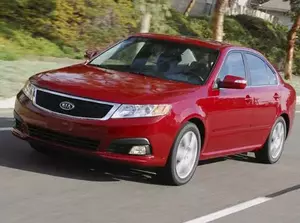
| Vehicle | Curb weight | Difference from world's smallest | Weight to power ratio | 0—60 mph acceleration ratio | Consumption ratio |
|---|---|---|---|---|---|
| 2.0 CVVT |
1418 kg / 3127 lbs |
993 kg (2190 lbs) heavier | 9 kg to 1 hp | 151 kg/s (333 lbs/s) |
189 kg/L (417 lbs/L) |
| 2.7 V6 |
1508 kg / 3325 lbs |
1083 kg (2388 lbs) heavier | 8 kg to 1 hp | 175 kg/s (386 lbs/s) |
166 kg/L (366 lbs/L) |
| 2.0 CRDi |
1528 kg / 3369 lbs |
1103 kg (2432 lbs) heavier | 10 kg to 1 hp | 156 kg/s (344 lbs/s) |
255 kg/L (562 lbs/L) |
| 2.4 CVVT |
1432 kg / 3158 lbs |
1007 kg (2221 lbs) heavier | 8 kg to 1 hp | - | - |
| Vehicle | 2.0 CVVT |
|---|---|
| Curb weight |
1418 kg / 3127 lbs |
| Difference from world's smallest | 993 kg (993 lbs) heavier |
| Weight to power ratio | 9 kg to 1 hp |
| 0—60 mph acceleration ratio | 151 kg/s (333 lbs/s) |
| Consumption ratio |
189 kg/L (417 lbs/L) |
| Vehicle | 2.7 V6 |
| Curb weight |
1508 kg / 3325 lbs |
| Difference from world's smallest | 1083 kg (1083 lbs) heavier |
| Weight to power ratio | 8 kg to 1 hp |
| 0—60 mph acceleration ratio | 175 kg/s (386 lbs/s) |
| Consumption ratio |
166 kg/L (366 lbs/L) |
| Vehicle | 2.0 CRDi |
| Curb weight |
1528 kg / 3369 lbs |
| Difference from world's smallest | 1103 kg (1103 lbs) heavier |
| Weight to power ratio | 10 kg to 1 hp |
| 0—60 mph acceleration ratio | 156 kg/s (344 lbs/s) |
| Consumption ratio |
255 kg/L (562 lbs/L) |
| Vehicle | 2.4 CVVT |
| Curb weight |
1432 kg / 3158 lbs |
| Difference from world's smallest | 1007 kg (1007 lbs) heavier |
| Weight to power ratio | 8 kg to 1 hp |
| 0—60 mph acceleration ratio | - |
| Consumption ratio | - |
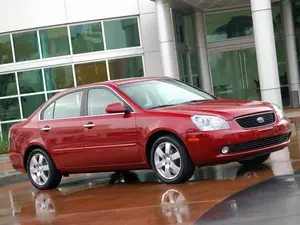
| Vehicle | Curb weight | Difference from world's smallest | Weight to power ratio | 0—60 mph acceleration ratio | Consumption ratio |
|---|---|---|---|---|---|
| 2.0 CRDi |
1525 kg / 3363 lbs |
1100 kg (2426 lbs) heavier | 11 kg to 1 hp | 154 kg/s (340 lbs/s) |
254 kg/L (560 lbs/L) |
| 2.0 CVVT |
1408 kg / 3105 lbs |
983 kg (2168 lbs) heavier | 10 kg to 1 hp | 145 kg/s (320 lbs/s) |
183 kg/L (404 lbs/L) |
| 2.7i V6 24V |
1491 kg / 3288 lbs |
1066 kg (2351 lbs) heavier | 8 kg to 1 hp | - |
159 kg/L (351 lbs/L) |
| Vehicle | 2.0 CRDi |
|---|---|
| Curb weight |
1525 kg / 3363 lbs |
| Difference from world's smallest | 1100 kg (1100 lbs) heavier |
| Weight to power ratio | 11 kg to 1 hp |
| 0—60 mph acceleration ratio | 154 kg/s (340 lbs/s) |
| Consumption ratio |
254 kg/L (560 lbs/L) |
| Vehicle | 2.0 CVVT |
| Curb weight |
1408 kg / 3105 lbs |
| Difference from world's smallest | 983 kg (983 lbs) heavier |
| Weight to power ratio | 10 kg to 1 hp |
| 0—60 mph acceleration ratio | 145 kg/s (320 lbs/s) |
| Consumption ratio |
183 kg/L (404 lbs/L) |
| Vehicle | 2.7i V6 24V |
| Curb weight |
1491 kg / 3288 lbs |
| Difference from world's smallest | 1066 kg (1066 lbs) heavier |
| Weight to power ratio | 8 kg to 1 hp |
| 0—60 mph acceleration ratio | - |
| Consumption ratio |
159 kg/L (351 lbs/L) |
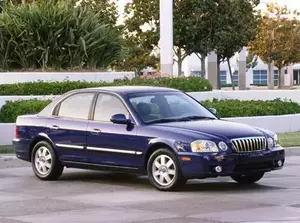
| Vehicle | Curb weight | Difference from world's smallest | Weight to power ratio | 0—60 mph acceleration ratio | Consumption ratio |
|---|---|---|---|---|---|
| 2.0i 16V |
1415 kg / 3120 lbs |
990 kg (2183 lbs) heavier | 10 kg to 1 hp | 130 kg/s (287 lbs/s) |
155 kg/L (342 lbs/L) |
| 2.0 |
1420 kg / 3131 lbs |
995 kg (2194 lbs) heavier | 10 kg to 1 hp | - | - |
| LX 2.4 |
1497 kg / 3301 lbs |
1072 kg (2364 lbs) heavier | 11 kg to 1 hp | - | - |
| 1.8 |
1390 kg / 3065 lbs |
965 kg (2128 lbs) heavier | 10 kg to 1 hp | - | - |
| LX 2.7 V6 |
1487 kg / 3279 lbs |
1062 kg (2342 lbs) heavier | 9 kg to 1 hp | - | - |
| 2.5 V6 |
1450 kg / 3197 lbs |
1025 kg (2260 lbs) heavier | 8 kg to 1 hp | - | - |
| Vehicle | 2.0i 16V |
|---|---|
| Curb weight |
1415 kg / 3120 lbs |
| Difference from world's smallest | 990 kg (990 lbs) heavier |
| Weight to power ratio | 10 kg to 1 hp |
| 0—60 mph acceleration ratio | 130 kg/s (287 lbs/s) |
| Consumption ratio |
155 kg/L (342 lbs/L) |
| Vehicle | 2.0 |
| Curb weight |
1420 kg / 3131 lbs |
| Difference from world's smallest | 995 kg (995 lbs) heavier |
| Weight to power ratio | 10 kg to 1 hp |
| 0—60 mph acceleration ratio | - |
| Consumption ratio | - |
| Vehicle | LX 2.4 |
| Curb weight |
1497 kg / 3301 lbs |
| Difference from world's smallest | 1072 kg (1072 lbs) heavier |
| Weight to power ratio | 11 kg to 1 hp |
| 0—60 mph acceleration ratio | - |
| Consumption ratio | - |
| Vehicle | 1.8 |
| Curb weight |
1390 kg / 3065 lbs |
| Difference from world's smallest | 965 kg (965 lbs) heavier |
| Weight to power ratio | 10 kg to 1 hp |
| 0—60 mph acceleration ratio | - |
| Consumption ratio | - |
| Vehicle | LX 2.7 V6 |
| Curb weight |
1487 kg / 3279 lbs |
| Difference from world's smallest | 1062 kg (1062 lbs) heavier |
| Weight to power ratio | 9 kg to 1 hp |
| 0—60 mph acceleration ratio | - |
| Consumption ratio | - |
| Vehicle | 2.5 V6 |
| Curb weight |
1450 kg / 3197 lbs |
| Difference from world's smallest | 1025 kg (1025 lbs) heavier |
| Weight to power ratio | 8 kg to 1 hp |
| 0—60 mph acceleration ratio | - |
| Consumption ratio | - |
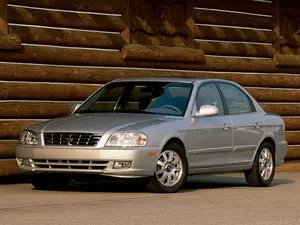
| Vehicle | Curb weight | Difference from world's smallest | Weight to power ratio | 0—60 mph acceleration ratio | Consumption ratio |
|---|---|---|---|---|---|
| 2.5 V6 |
1480 kg / 3263 lbs |
1055 kg (2326 lbs) heavier | 9 kg to 1 hp | 183 kg/s (404 lbs/s) |
161 kg/L (355 lbs/L) |
| 1.8 |
1320 kg / 2911 lbs |
895 kg (1974 lbs) heavier | 10 kg to 1 hp | - | - |
| 2.0 |
1478 kg / 3259 lbs |
1053 kg (2322 lbs) heavier | 11 kg to 1 hp | 146 kg/s (322 lbs/s) |
162 kg/L (357 lbs/L) |
| LX 2.4 |
1490 kg / 3285 lbs |
1065 kg (2348 lbs) heavier | 10 kg to 1 hp | - | - |
| LX 2.5 V6 |
1495 kg / 3296 lbs |
1070 kg (2359 lbs) heavier | 9 kg to 1 hp | - | - |
| LX 2.7 V6 |
1447 kg / 3191 lbs |
1022 kg (2254 lbs) heavier | 8 kg to 1 hp | - | - |
| Vehicle | 2.5 V6 |
|---|---|
| Curb weight |
1480 kg / 3263 lbs |
| Difference from world's smallest | 1055 kg (1055 lbs) heavier |
| Weight to power ratio | 9 kg to 1 hp |
| 0—60 mph acceleration ratio | 183 kg/s (404 lbs/s) |
| Consumption ratio |
161 kg/L (355 lbs/L) |
| Vehicle | 1.8 |
| Curb weight |
1320 kg / 2911 lbs |
| Difference from world's smallest | 895 kg (895 lbs) heavier |
| Weight to power ratio | 10 kg to 1 hp |
| 0—60 mph acceleration ratio | - |
| Consumption ratio | - |
| Vehicle | 2.0 |
| Curb weight |
1478 kg / 3259 lbs |
| Difference from world's smallest | 1053 kg (1053 lbs) heavier |
| Weight to power ratio | 11 kg to 1 hp |
| 0—60 mph acceleration ratio | 146 kg/s (322 lbs/s) |
| Consumption ratio |
162 kg/L (357 lbs/L) |
| Vehicle | LX 2.4 |
| Curb weight |
1490 kg / 3285 lbs |
| Difference from world's smallest | 1065 kg (1065 lbs) heavier |
| Weight to power ratio | 10 kg to 1 hp |
| 0—60 mph acceleration ratio | - |
| Consumption ratio | - |
| Vehicle | LX 2.5 V6 |
| Curb weight |
1495 kg / 3296 lbs |
| Difference from world's smallest | 1070 kg (1070 lbs) heavier |
| Weight to power ratio | 9 kg to 1 hp |
| 0—60 mph acceleration ratio | - |
| Consumption ratio | - |
| Vehicle | LX 2.7 V6 |
| Curb weight |
1447 kg / 3191 lbs |
| Difference from world's smallest | 1022 kg (1022 lbs) heavier |
| Weight to power ratio | 8 kg to 1 hp |
| 0—60 mph acceleration ratio | - |
| Consumption ratio | - |